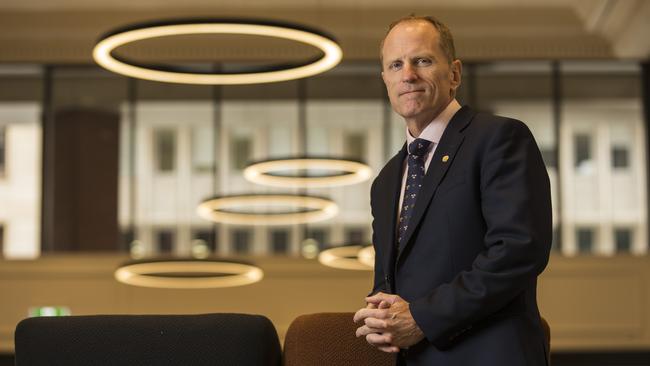Energy sector turns to top communicator Andrew McConville
The energy industry has chosen someone with a background in communications to lead its prime industry body.

It says a lot about the current issues facing the sector that the Australian oil and gas industry has chosen someone with a background in communications, rather than petroleum, to lead its prime industry body.
New Australian Petroleum Production and Exploration Association chief executive Andrew McConville spent more than a decade at agriculture giant Sygenta, most recently based in Switzerland as the group’s global head of external affairs and communications.
His arrival back in Australia comes at a time when the oil and gas industry finds itself at the centre of several major policy issues that have tested its standing in the eyes of the community.
Gas prices on the east coast of Australia remain a key concern for both industry and households, bans and moratoriums on drilling remain in place in many pockets of the country, the oil majors’ record on tax is a popular target for scrutiny, and the oil and gas sector stands out as one of the industries likely to be most directly affected by climate policy.
In his first detailed interview since starting in the job in late March, Mr McConville said a key priority was to lead a better and sustained era of engagement with communities — something he says the industry has struggled to do consistently.
“We’ve worried about having good policy, which is really important, and we’ve worried about good engagement with the government, but that’s not enough,” he said.
“We’ve got to build this trust and goodwill in the broader community. That’s the piece we’ve been missing.”
More immediately, however, it will be up to Mr McConville to lead the oil and gas sector’s engagement with the winner of next weekend’s federal election.
Like many in the corporate sector, Mr McConville’s biggest hope for the election is that, regardless of which party wins, they emerge with a clear majority.
That would pave the way for policy certainty on the key issues facing the industry, such as climate change and taxation.
“The only way that can happen is if you’ve got a government in power with the ability to make decisions and get on and get things done quickly,” he said.
While other big industry bodies such as the Minerals Council of Australia and the World Coal Association have been under pressure from members over their positions on climate change, Mr McConville says APPEA enjoys full support from its members over the need to move to a lower-carbon economy.
The industry is ready to act, he says; there is just the need for clear policy settings out of Canberra.
“It’s about certainty and being able to move relatively quickly,” he said.
“What we wouldn’t like is to be sitting here in 12 months’ time having the same conversation.”
Mr McConville notes that next weekend’s federal election will start a period of relative political stability across the country, with no further elections scheduled until Queensland goes to the polls in October 2020.
That, he hopes, will open a window for real progress in aligning policies and regulations between the states and federally.
As it stands today there are a host of different regimes and bans across the country that Mr McConville says have contributed to the gas supply issues that have driven up gas prices on the east coast.
“We do need far greater consistency between the states and the feds, and getting them to actually work together in a coherent sense is important,” he said.
“While there’s some level of political stability, and we’re in a position where perhaps politicians have the confidence to make decisions, we can get in and start a conversation and try to get some of those decisions aligning.”
Mr McConville is even hopeful of some progress in Victoria, which has moratoriums in place over all oil and gas drilling.
He believes rising gas prices that finally prompt a policy shift, with that crunch time “probably coming sooner rather than later”.
“It’s going to become more acute as the gas out of Bass Strait becomes less and as we see shutdowns of some of the coal-fired power stations. The situation is going to become more chronic,” he said.
“One of the easier answers is to open up supply. We will advocate very strongly to the Victorian government to try to give them the confidence from a scientific, environmental and safety perspective that conventional gas operations onshore and offshore are consistent with the government’s own objectives.” Mr McConville will also be responsible for continuing with APPEA’s ‘‘Brighter’’ initiative, which aims to promote the industry’s contribution to the community, regions and the transition to cleaner energy, as well as Energy Information Australia.
The latter is designed to provide factual, evidence-based information about the sector and challenge what the industry sees as the false and exaggerated claims made by its opponents.
For all the efforts by the sector to engage with politicians and communities, a sufficiently eye-catching video clip or post on Twitter or Facebook by an anti-oil and gas activist can gain more traction, more quickly.
Mr McConville noted that the rise of social media allowed for misinformation about the industry to spread quicker than before.
“With the advent of social media, the rules of the game have changed for some groups but not some others,” he said.
“As a corporate you’re in an environment of continuous disclosure … whereas (others) may not be bound by those same rules.” That imbalance, means the industry has to do more to get the debate back on an even keel.


To join the conversation, please log in. Don't have an account? Register
Join the conversation, you are commenting as Logout